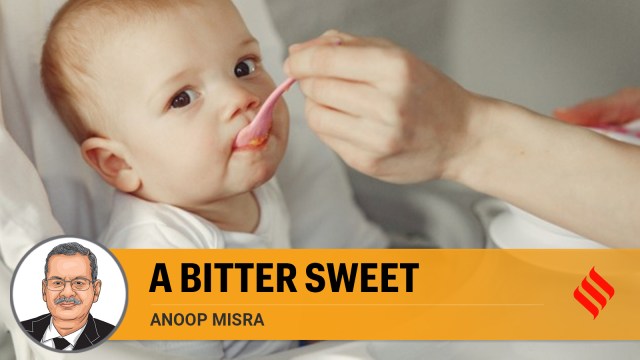
In 2006, we published a report describing a cohort of 51 children and young adults with Type 2 Diabetes — this was a surprising finding at the time. Little did we know then that a supplement used at six months of age containing added sugar (such as in Cerelac and others produced by Nestle, as detailed in a recent report by the International Baby Food Action Network, IFBAN) could also contribute to obesity and diabetes. Interestingly, prior to the current report, a study conducted in India in 2021 revealed that 28 per cent of baby food products had a “high sugar profile”. These revelations are particularly concerning for several reasons.
First, considering the heightened propensity of Indians for developing diabetes and its complications, every effort must be made to avoid any potential triggers from an early age. Introducing sugar-containing feeds at the age of six months is highly detrimental to Indian infants who are already fragile. Damage to organ systems at this stage leaves permanent metabolic scars.
How does such baby food harm the tender livers and pancreases of infants? Constant exposure to simple sugars places an additional burden on the pancreas to produce insulin (resulting in “hyperinsulinemia”), leading to its exhaustion. This process also induces resistance to the hormone leptin and in the process contributes to obesity. Both pancreatic exhaustion and excess body fat raise blood sugar levels and release harmful substances known as “inflammatory cytokines”, which can damage the kidneys and heart and lead to hypertension.
Additionally, formula-fed infants continuously exposed to a predominantly sweet taste are more likely to develop a preference for such flavours later in their lives.
This has the potential to foster a dependence on sweet intake, perpetuating early organ damage in adolescence and early adulthood. It would be worthwhile to conduct long-term studies on children who have received such products from an early age to assess their risk of developing diabetes and heart disease.
Second, there is a notable discrepancy in the treatment of developing countries regarding the presence of excess added sugar in infant formulas. While formulas without added sugar are available in developed countries, those in developing nations, including India, often contain added sugars. This double standard is unjustified and unethical, particularly because some developing countries do not even list the amount of added sugar on product labels.
Third, the promotion of sugar-containing infant formulas in India and other developing countries raises concerns. Cerelac, a popular brand with substantial sales is promoted as “supplementary food for babies from 10 to 12 months”, despite containing significant amounts of added sugar. The high sugar content is alarming and is unacceptable for anyone, let alone infants.
Equally concerning are the other unhealthy practices being pursued by other companies — these include influencing doctors, medical societies and media celebrities endorsing unhealthy products and claims that infant formula is healthier than breast milk, etc. There is often also an effort to promote such unhealthy products by engineering expert and celebrity endorsements.
The inclusion of added sugars in infant formulas amplifies the threat of obesity, diabetes, and heart disease at an early age for populations, like India’s, with a known propensity to such diseases. It’s akin to pouring gasoline on a smouldering flame, intensifying an already critical health concern. Regulation in this matter demands unequivocal stringency.
Misra is chairman, Fortis C-DOC Hospital for Diabetes and Allied Sciences and the author of Diabetes with Delight


